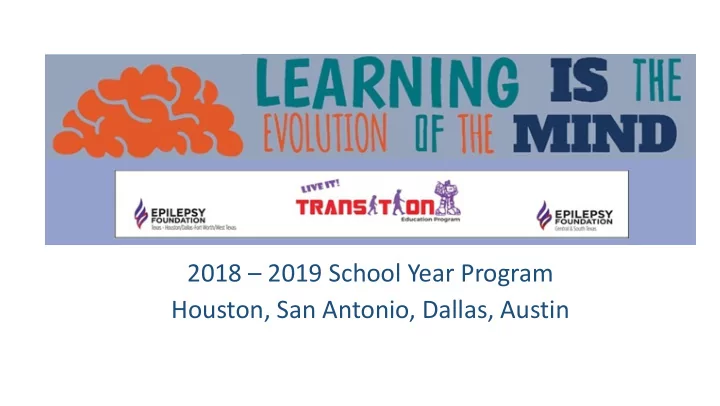

2018 – 2019 School Year Program Houston, San Antonio, Dallas, Austin
Introduction • Overview • Importance of Transition • Topics for the Year • Supporting your teen
Overview • The program is designed to offer teens a chance to get to know other teens living with epilepsy • Teens will also learn more about living with epilepsy and becoming an adult • Parents and caregivers will have the opportunity to get tools and advice on parenting their teen as they transition into adulthood. • The meetings also offers parents and caregivers the opportunity to connect
Importance of Transition • Preparing for adulthood • Gaining independence • Learning to manage seizures and epilepsy • Going to an adult neurologist • Self-Advocacy
The transition process is unique to each teen
Topics for the Year • Advocating for Awareness • Transitioning to Adulthood • Technology and Epilepsy • Medical Transition and Managing Living with Epilepsy • Living with Epilepsy and School • Driving and Epilepsy
New Initiatives in Health Care • Transition Care Plans • Patient Centered Medical Home • Seizure Action Plan
Transition Care Plans • Youth health care transition is the process of getting ready for adult health care • As youth get older, managing medical needs becomes their own responsibility in new ways • Achieving this independence requires an organized transition process • Independent health care skills • Preparation for an adult model of care • Transfer to new providers
Patient Centered Medical Home
Seizure Action Plan Basics • This plan informs people working with your teen about their epilepsy and types of seizures they have • School personnel can greatly benefit from learning more about a student’s individual health needs and how to help them • This plan should be provided to all administrative staff and teachers at the school • Some schools use an “Individual Health Plan," which can be used as the Seizure Action Plan • Reviewed and signed by your child’s doctor
Seizure Action Plan Information Included • Description of child’s seizures and epilepsy • Description of treatments • What the student is taking • When and how medications are given • Side effects of treatment • Description of first aid response in school and on the bus • Description of what constitutes an emergency for your child • Description of emergency response • Rescue medication • Vagus nerve stimulator magnet use • Contact information for parents/caregivers, doctors, ???
Technology and Epilepsy • EFTX and EFCST have released our Med Monitor App this summer • The app can be downloaded in the App Store • Please download the app and share your feedback • Focus group for teens after November meeting
Medical Binder • Medical Form • Seizure Diary • Seizure Action Plan • Transition Guide
Medical Binder Information to Include • Patient Information • Patient History • Parent Information • Patient Medication • Insurance Information
Fostering Health Independence • Keep track of when medications are taken • Log seizures • Sign in for appointment • Report medications being taken • Report seizures to doctor • Answer doctor’s questions • Ask questions to the doctor
Teen Survey • Out goal for the Live It! Transition program is to offer a fun place for teens to learn about living with epilepsy and ways they can begin to become a more active part of maintaining their health • We ask every teen to fill out a survey at their first meeting of the year • We will ask teens to fill out a survey at the end of the year, as well • The responses from the beginning of the year and the end of the year will be used to measure the effectiveness of the education program
MedMonitor App • Epilepsy Foundation Texas Affiliates’ New App • Medication reminder • Medication monitoring system • User can connect to a Circle of Care
Teen Focus Group • We will be inviting teens who have sued the app to join a focus group later this fall • We would like to hear from teen app users what they like about the app, how they would like to see the app improved, and other ideas they may have for the app • More information about participation will be provided • Incentives will be provided
Conclusions • Our goal for this program is to offer you and your teen support and information as they move through adolescence and transition to adulthood • No two teens are alike, therefore, no transition process will be the same • The meetings this year will cover topics related not only to transitioning to adult neurological care, but also fostering independence, and encouraging self- advocacy.
Questions?
Thank you!
Recommend
More recommend